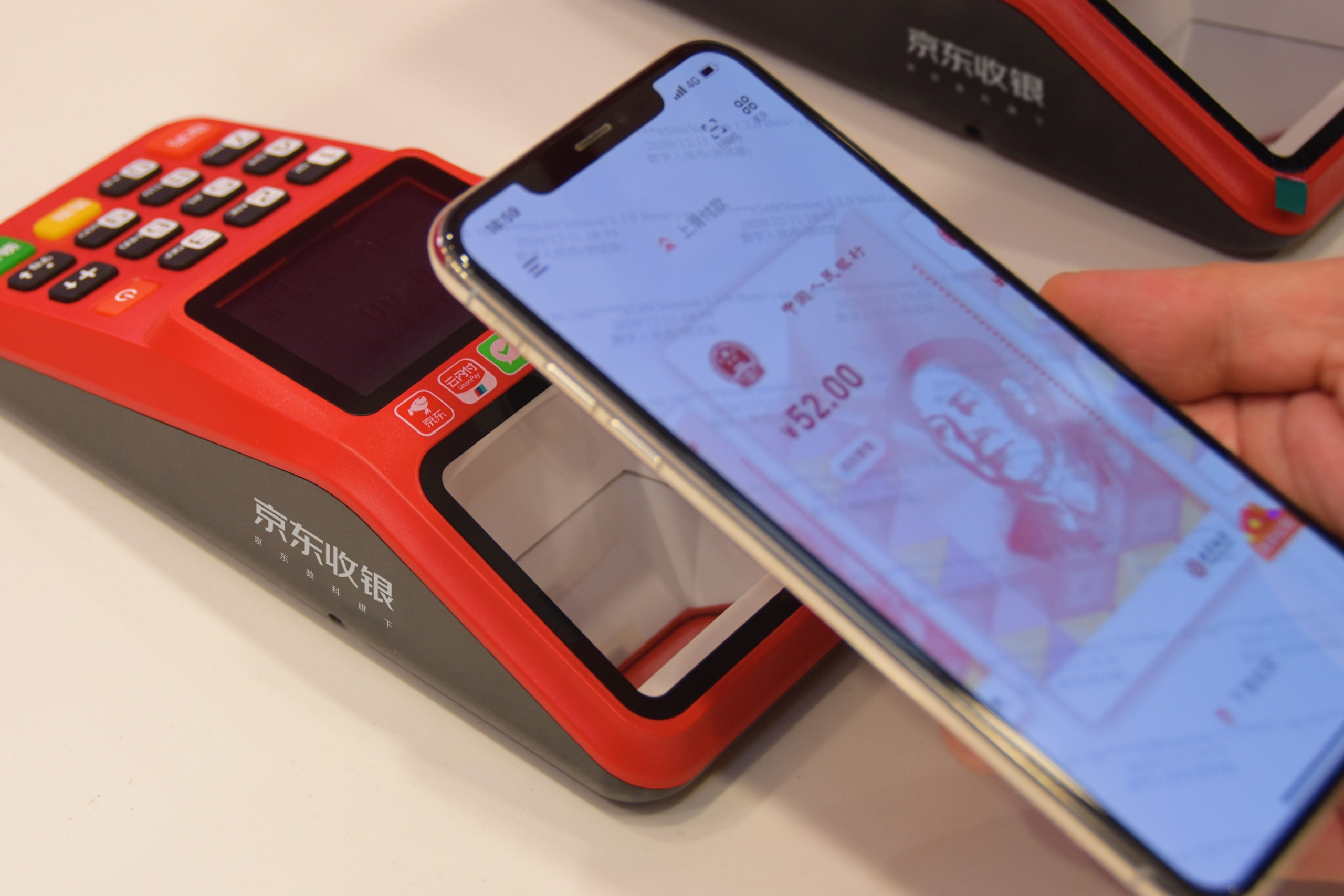Mar 17, 2021|
In-depth Report: The Future of Digital Currency and the Role of JD
by Ling Cao
Digital Currency, or DC/EP (Digital Currency/Electronic Payment), was a hot topic during the latest annual sessions of China’s National People’s Congress and Chinese People’s Political Consultative Conference (CPPCC) held during Mar. 5 to 11 in Beijing. Many deputies and members shared their plans for promoting the program, which is viewed as one of the key driving forces of building China’s digital economy.
As development continues, JD Technology will continue to support these efforts with integrated technology and services, after enabling China’s very first online order by DC/EP via JD’s ecommerce platform in 2020.
Cash-on-delivery services provided by JD for customers via DC/EP
Fuwen Gong, member of the National Committee of the CPPCC, and associate chief judge of Shaanxi Higher People’s Court, recommended, “The trial of DC/EP should concentrate on three aspects: holding top-level design, confirming its status as lawful currency, and amending descriptions in some of the rules to include DC/EP, in addition to paper money and coin, as a lawful form of RMB in China. The other two aspects are taking importance of the currency’s inclusiveness and risk control.”
Rapid mobile payment development in China
In China, the internet development has seen rapid growth over the past years, with over 989 million netizens as of December 2020, according to China Internet Network Information Center, with penetration rate over 70%. Residents have also gotten used to cashless payment anywhere, either online or offline, with the rise of mobile payment platforms such as WeChat Pay.
The digital environment forms a good foundation to incubate the nation’s own digital currency, the DC/EP. Dr. Jianguang Shen, Chief Economist at JD Technology said, “The rapid development of mobile payment in China has accelerated the country to promote the digital currency trial in a relatively early time compared with countries worldwide.”
Open attitude from PBOC
DC/EP first emerged in 2014, when the PBOC (the People’s Bank of China) formed a special team to research the lawful digital currency, and in January 2017, the bank formally established the Digital Currency Institute to promote the development of DC/EP.
After several years of development, 2020 marks a trial application milestone for China’s DC/EP landscape, with several cities facilitating the trial programs. Among them, Shenzhen was the first city to conduct a trial in October 2020, supporting the transaction in offline stores.
Two months later, JD Technology joined the initiative by supporting Suzhou, the second city to conduct a trial. Utilizing JD Technology’s integrated technology and service solutions, the city issued RMB 20 million DC/EP consumption red envelopes to residents. As part of this program, JD Technology also supported China’s first online order by DC/EP via JD’s platform. Suzhou recently conducted a second trial, also supported by JD.
 The DC/EP payment solution in offline scenarios
The DC/EP payment solution in offline scenarios
According to Changchun Mu, Director of Digital Currency Research Institute of PBOC, the bank always holds an open and neutral attitude for DC/EP in order to create an inclusive digital ecosystem. “The DC/EP’s exchange service will be provided by designated institutions, while the circulation service can be done by third party payment institutions and other business banks,” Mu said. “These banks and institutions will also be responsible for the retail management, including payment product design and innovation, application expanding, market promotion, R&D, as well as maintenance.”
The positive government environment has stimulated the market vitality, with many enterprises also participating to make their contribution, such as JD.com, Meituan, Didi and more.
JD: providing technology and services
Among enterprises, JD Technology was in the first group of technology companies to test the DC/EP in China with state owned banks and connected with online scenarios. It has already supported DC/EP’s four test runs in Suzhou, Beijing and Chengdu, which have gained experience in operations and solutions, as well as offering new shopping scenarios for customers. JD has now cooperated with six state-owned banks and connected with online scenarios. It has also helped merchants upgrade their cashier machines and connect them with their stores’ ERP (Enterprise Resource Planning) system, improving efficiency and experience.
Fei Peng, head of the DCEP program at JD Technology said, “By using frontier technologies such as AI, big data, cloud computing, and through omnichannel, stable customer service capabilities, as well as application experience, JD Technology aims to contribute its efforts in the DC/EP’s wallet ecosystem building, supporting local governments’ test runs, and exploring more real scenarios.”
Local residents are enthusiastic about the new programs. Data showed that during Suzhou’s Double 12 (Dec. 12) Shopping Festival in 2020, JD’s online platform received nearly 20,000 orders by DC/EP in the first 24 hours, among them the largest online payment was over RMB 10,000 yuan. JD data also showed that 41.7% of people using DC/EP envelopes were born post-1980s, and 37.4% were born post-1990s. Over half of the customers placed orders within one hour after the festival kicked off.
In March, the first DC/EP consumption envelope test run in western China has been facilitated in Chengdu, with 4.2 million applicants registered for the program, showing residents’ willingness to embrace the test.
Inclusiveness of DC/EP
As a new project, people are not obligated to integrate DC/EP into daily payments. Mu shared, “The government won’t force the distribution of DC/EP; it should be issued according to people’s need in the way of marketization. DC/EP and the paper money will exist together for a long time.”
Issued by PBOC, DC/EP is legal tender, and is the digital version of cash. It supports controllable anonymous payment, and offline payment in an environment when two parties are both having no access to internet.
Residents can simply make transactions by downloading a DC/EP app, and six state-owned banks support exchange services.
 One customer shows the red envelop page from her cellphone
One customer shows the red envelop page from her cellphone
On why China needs DC/EP, Mu explained in his public lecture on the Dedao platform, “First, it can protect our monetary sovereignty and legal currency status. We need to prepare in advance. Second, paper money is an expensive process that requires anti-counterfeiting technology, and more and more people are reluctant to carry cash now. Additionally, the current internet payments are normally connected with a bank account, which aren’t anonymous, and thus cannot support some of the private payment purposes.”
Dr. Shen from JD commented, “DC/EP is a new area which may break the current mobile payment layout in China. It is not just a currency, but a way of payment, which is of great significance.”
In fact, the DC/EP’s development is still in an early stage. Enterprises and institutions will continue to support under PBOC’s pace, promoting the digital transformation of China’s economy, especially by making it more user-friendly to avoid creating a digital gap. Mu said, “We want to include people from developing areas who lack experience in digitalization, so we will work to make DC/EP more inclusive. For example, we are developing tailored products for people who do not have smart devices.”
As digital currency continues to grow in importance for China’s economy, JD Technology is committed to supporting its development. Fei Peng from JD shared, “JD has over 471 million annual active users, and nationwide logistics services, as well as omnichannel operations, and these advantages will help promote the building of the DC/EP ecosystem.”


 This Harbin tourism boom has also spurred a surge in sales of winter apparel. JD.com’s data indicates a rapid growth in the sales of warm clothing items such as down jackets, snow boots, and thermal underwear between January 1st and 7th. The sales growth is especially pronounced in southern provinces and cities such as Jiangsu, Zhejiang, Guangdong, Sichuan, and Shanghai. Notably, tall snow boots registered a 206% year-on-year increase in transactions, while padded cotton caps and thickened long down jackets soared by 158% and 134%, respectively. Beyond clothing, travel gear has also seen a considerable uptick, with a 98% year-on-year growth in transactions for large suitcases and travel backpacks in these southern regions.
This Harbin tourism boom has also spurred a surge in sales of winter apparel. JD.com’s data indicates a rapid growth in the sales of warm clothing items such as down jackets, snow boots, and thermal underwear between January 1st and 7th. The sales growth is especially pronounced in southern provinces and cities such as Jiangsu, Zhejiang, Guangdong, Sichuan, and Shanghai. Notably, tall snow boots registered a 206% year-on-year increase in transactions, while padded cotton caps and thickened long down jackets soared by 158% and 134%, respectively. Beyond clothing, travel gear has also seen a considerable uptick, with a 98% year-on-year growth in transactions for large suitcases and travel backpacks in these southern regions.
 JD Awarded by Beijing Government for Poverty Alleviation Efforts
JD Awarded by Beijing Government for Poverty Alleviation Efforts



